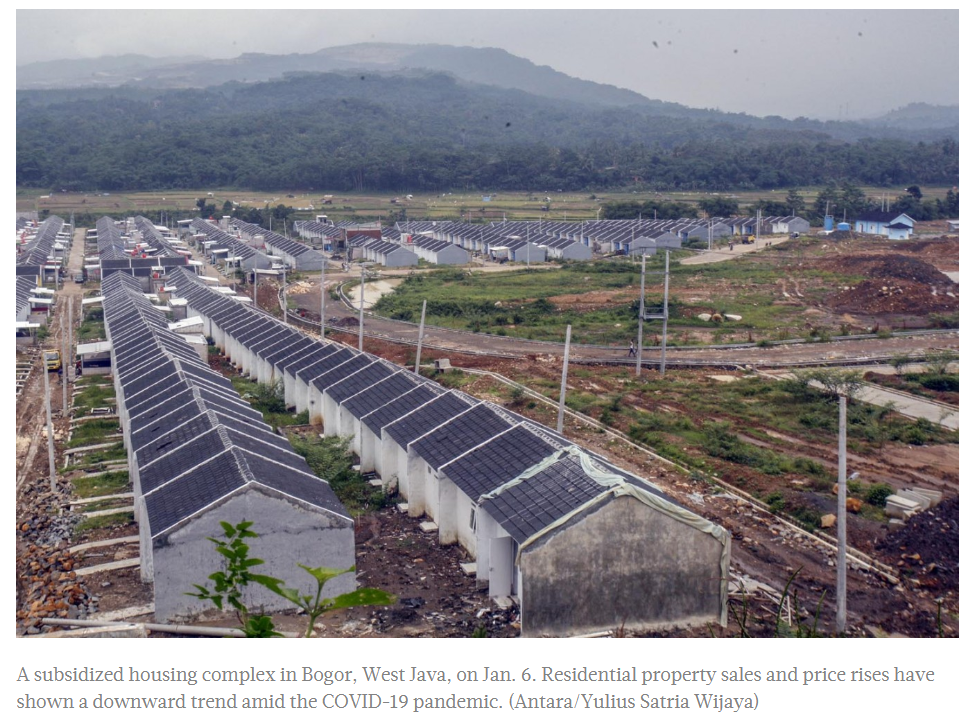Indonesia: Residential property sales, prices rise cool as pandemic hits economy
Residential property sales and prices rise have shown a downward trend amid the COVID-19 pandemic, which has battered people’s purchasing power and developers’ marketing efforts, despite lower mortgage interest rates.
Totok Lusida, the chairman of the Real Estate Indonesia (REI), an association of 6,400 developers, said on May 18 that aside from hindered construction, social restrictions implemented to curb the outbreak have disrupted marketing efforts.
“Although we try to do online marketing, consumers eventually want to physically see [the projects],” Totok told The Jakarta Post in a phone interview. “They want to know the location, meet us in person.”
The COVID-19 outbreak has infected at least 22,700 people in Indonesia and killed more than 1,300 as of Monday afternoon, according to official data, forcing the government to impose large-scale social restrictions in four provinces and 26 regencies/cities, including in business centers Greater Jakarta, Bandung in West Java and Surabaya in East Java.
A recent survey by Bank Indonesia (BI) revealed that the combined sales of small, medium and large houses fell by 43.19 percent year-on-year (yoy) in the first three months of the year, largely because of the unfolding COVID-19 pandemic.
The industry still booked an annual growth of 1.19 percent in sales in the fourth quarter of last year.
In line with the declining trend in sales, the disbursement growth of housing and apartment mortgages nearly halved by 4.34 percent year-on-year in the first quarter of 2020.
Nearly 18 percent of surveyed respondents told the central bank that the decline in sales was mainly driven by high mortgage interest rates. But mortgage interest rates actually fell by 0.2 percentage points on average to 8.92 percent in the first three months of the year from the previous quarter.
The residential property industry relies heavily on mortgages because consumers who paid houses using loans reached 74.73 percent in the January-March period, higher by nearly 3 percentage points than in the September-December period of last year.
Developer PT Panasonic Homes Gobel Indonesia, for instance, had to close the marketing office of a joint housing project with developer Sinar Mas Land, called Savasa and located on 37 hectares of land in Cikarang, West Java, following the social restrictions.
“Under the large-scale social restrictions, consumers are afraid to [leave their homes] so they cannot visit our project,” Panasonic Homes Gobel Indonesia director Wulang Widyatmoko said in an online talk on May 15.
“In this situation, the people’s purchasing power is also declining and some want to cancel [their purchases],” he added,
Manpower Ministry data shows that more than 2 million people have lost their job as of April 20, posing risks of a further decline in household spending, which contributes to over half of the country’s economy. Private spending growth plunged to 2.84 percent yoy in this year’s first quarter, dragging the economic expansion pace to just 2.97 percent, the lowest in 19 years.
As fewer people made home purchases, the growth in residential property prices was slightly slower at 1.68 percent yoy in the January-March period compared to 1.77 percent yoy in the last three months of 2019, according to BI’s quarterly Residential Property Prices Index (IHPR) survey.
The bank expects the price growth to slow further to 1.56 percent yoy in the second quarter of the year as uncertainty looms regardless of the government’s plan to gradually lift COVID-19 restrictions in July.
Bagus Adikusumo, the senior director of office services at Colliers International, a real estate services firm operating in 68 countries, concurred with the central bank’s bleak outlook. He said the property industry’s growth in general was in line with the overall trend in the economy.
“I still see the housing business as a short-term solution for developers,” Bagus told the Post in a phone interview on May 18. “But if we are talking about the next quarter, it is still difficult as the economy and income of potential buyers remain uncertain. So, it is likely that the slowdown will continue in the third quarter of the year.”
Some major developers have furloughed workers to cut costs and offset losses due to declining sales, said Bagus. Developers with many houses to sell might want to offer discounted prices to attract potential buyers who emerge from the pandemic with a stronger footing.
The government has set aside Rp 1.5 trillion (US$101 million) for interest rate and down payment subsidies this year for low-income households to enable them to purchase a house. The relief allows low-income households to pay a mortgage annual interest rate of just 5 percent for a tenure of 10 years and for Papua and West Papua residents, 4 percent for a tenure of 20 years.
“We are optimistic that we will still see growth in our business performance, although the pandemic’s impact will still overshadow the global and national economy,” Pahala Mansury, the president director of state-owned subsidized mortgage-focused Bank Tabungan Negara (BTN) said in a statement on May 15.
Source: https://www.thejakartapost.com/news/2020/05/26/residential-property-sales-prices-rise-cool-as-pandemic-hits-economy.html


 English
English




